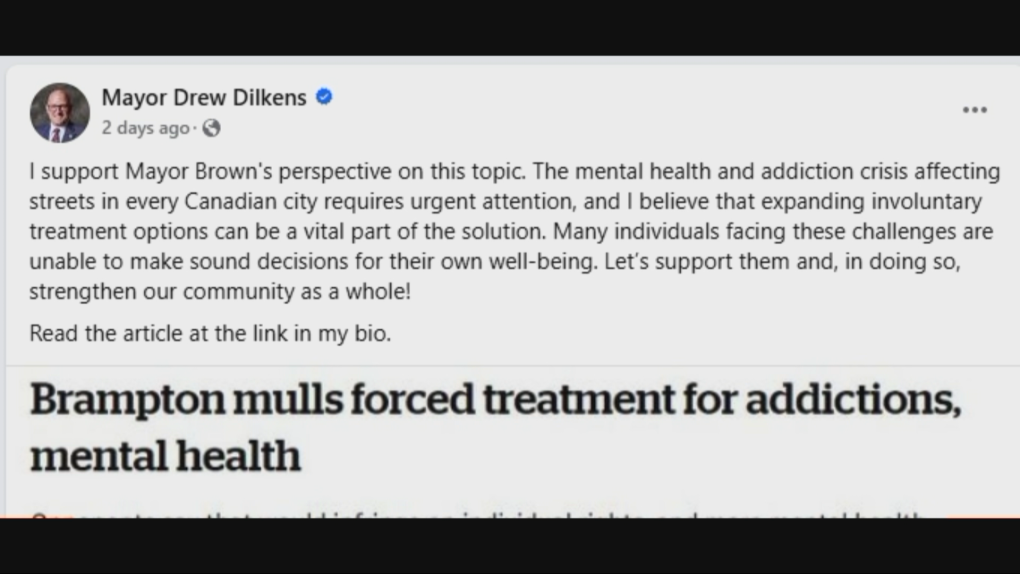Support for involuntary mental health or addictions treatment
Windsor's mayor is backing a controversial proposal that would force people into involuntary mental health or addictions treatment.
What people across the province are talking about was referenced in a Facebook post by Mayor Drew Dilkens.
In it, Dilkens supported a perspective from Brampton Mayor Patrick Brown, who is calling on the Ontario government to make changes to the provincial mental health act that would force people with addictions and mental health into treatment.
Dilkens was not available for comment Thursday, but a couple of his councillors chimed in.
"No one's talking about kidnapping anybody here," said Coun. Ronaldo Agostino.
"What is happening right now is not working," said Coun. Angelo Marignani. "So, we need to focus on something, something new, something out of the box, and it might just be the mandatory treatments for individuals who, basically, they've given up. So, we have to give them hope."
Agostino added, "I'm talking about full time, supportive health care for the people that need it the most, and those people that need it the most also happen to be the people that are causing some of the grief for a lot of the other people in the areas where the help is needed."
 (Source: Drew Dilkens/Facebook)Involuntary treatment has been enacted in British Columbia. The verdict is still out on the success but the Canadian Mental Health Association B.C. shared its concerns in a report saying, "A movement to detain more people under these conditions and culture, without addressing significant gaps in the quality and effectiveness of care, will not lead to positive or dignified outcomes for people."
(Source: Drew Dilkens/Facebook)Involuntary treatment has been enacted in British Columbia. The verdict is still out on the success but the Canadian Mental Health Association B.C. shared its concerns in a report saying, "A movement to detain more people under these conditions and culture, without addressing significant gaps in the quality and effectiveness of care, will not lead to positive or dignified outcomes for people."
Chris Thibert is an addiction counselor with Phoenix at the Downtown Mission and says his experience taught him that hitting rock bottom was what it took for him to turn his life around.
"I came to the point where I knew that it was either sobriety, get better or die. It wasn't going to take them. It took me to finally wake up and say, okay, I want to live…. My kids on one side, my mom on the other side, yelling and screaming from both sides, trying to get me figuratively, trying to get me to change and I couldn't come to that realization until I did myself," he said.
Agostino feels if someone is repeatedly critical there should be a condition of sentence and treatment should be made available.
"I think it's policy changes now that we have to start looking at to coincide with some of the other things that are happening."
CTVNews.ca Top Stories

Canadian team told Trump's tariffs unavoidable in short term in surprise Mar-a-Lago meeting
During a surprise dinner at Mar-a-Lago, representatives of the federal government were told U.S. tariffs from the incoming Donald Trump administration cannot be avoided in the immediate term, two government sources tell CTV News.
Toronto man accused of posing as surgeon, performing cosmetic procedures on several women
A 29-year-old Toronto man has been charged after allegedly posing as a surgeon and providing cosmetic procedures on several women.
W5 Investigates 'I never took part in beheadings': Canadian ISIS sniper has warning about future of terror group
An admitted Canadian ISIS sniper held in one of northeast Syria’s highest-security prisons has issued a stark warning about the potential resurgence of the terror group.
Trump threatens 100% tariff on the BRIC bloc of nations if they act to undermine U.S. dollar
U.S. president-elect Donald Trump on Saturday threatened 100 per cent tariffs against a bloc of nine nations if they act to undermine the U.S. dollar.
'Disappointing': Toronto speed camera cut down less than 24 hours after being reinstalled
A Toronto speed camera notorious for issuing tens of thousands of tickets to drivers has been cut down again less than 24 hours after it was reinstalled.
Poilievre suggests Trudeau is too weak to engage with Trump, Ford won't go there
While federal Conservative Leader Pierre Poilievre has taken aim at Prime Minister Justin Trudeau this week, calling him too 'weak' to engage with U.S. president-elect Donald Trump, Ontario Premier Doug Ford declined to echo the characterization in an exclusive Canadian broadcast interview set to air this Sunday on CTV's Question Period.
Bruce the tiny Vancouver parrot lands internet fame with abstract art
Mononymous painter Bruce has carved a lucrative niche on social media with his abstract artworks, crafted entirely from the colourful juices of fruits.
Why this Toronto man ran so a giant stickman could dance
Colleagues would ask Duncan McCabe if he was training for a marathon, but, really, the 32-year-old accountant was committing multiple hours of his week, for 10 months, to stylistically run on the same few streets in Toronto's west end with absolutely no race in mind. It was all for the sake of creating a seconds-long animation of a dancing stickman for Strava.
Mont-Tremblant World Cup skiing races cancelled due to warm weather
Fans hoping to see the world's top woman skiers compete next week in Mont-Tremblant, Que., are out of luck after the PwC Tremblant World Cup was cancelled due to warm weather.
































